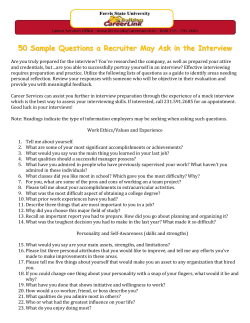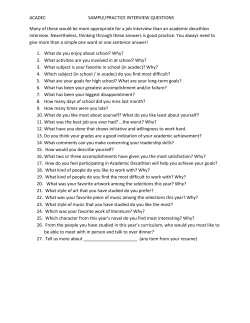
An interview is your opportunity to strut your stuff and... learn about the company and their people. The most important
Recruitment Interiew Preparation: Sample Answers The key is to give better answers than anyone else. To do this, you must: (1) Anticipate likely questions; (2) Develop excellent answers; (3) Practice! Be enthusiastic and confident when responding to questions. Don't rush your answers, but don't ramble on and on, either. Try to, um, avoid, like, using unnecessary words, right? And um, repeating yourself or, like, annoying phrases, you know? A good technique is to write out your answers to the questions you anticipate, then edit them to make them more concise. Then practice your polished answers out loud, over and over. If you can have someone help you do a "mock interview," that would be the best way to do this. Most questions will relate either to your ability to do the job or to the type of employee you will be. Here's one that is very commonly used to help the interviewer learn about both: "What do you feel has been your greatest work-related accomplishment?" Choose one example from your past that was important to you and helped the company you worked for. Give specific details about what you did, how you did it, and what the results were. Try to pick an accomplishment that relates to the position for which you are applying. Employers like to hear about accomplishments that reduced expenses, raised revenues, solved problems or enhanced a company's reputation. "What is your greatest strength?" This is a great chance to highlight your best skills. Don't pick just one, focus on your top three or four. Some examples are: leadership skills, team-building skills, and organizational skills. Determine which strengths would fit best with the position for which you are applying. For example, if the job announcement stresses the ability to handle multiple tasks, you could say: "I'm good at organizational skills, prioritization and time management. But my greatest strength is my ability to effectively handle multiple projects and deadlines." "Tell me a little about yourself." When responding to this request, you should focus on both your personal and professional values. Always be honest, but talk about your best traits only, especially those that relate to the position for which you are applying. Highlight experiences and accomplishments you are most proud of. Here's an example: "I'm an experienced communications specialist with extensive knowledge of public information tools and techniques. I've developed comprehensive communication plans for major public events, written dozens of articles accepted by worldwide publications, and created specialized educational programs for adults and students. I am always eager to learn new methods and procedures, and have implemented continuous improvement techniques in my past positions that saved money and increased productivity. I like working with people and enjoy group projects, but am also a self-starter who doesn't mind working on my own. I'm a volunteer with the local chapter of Special Olympics and enjoy participating in community events. My goals are to complete my Master's Degree and broaden my experiences with community relations." Remember to tailor your response to the specific job. By studying the job announcement, you'll get a good idea of the skills and experience being sought. Work those into your response. Consider this your own personal commercial. If the interview consisted of only this ONE chance to sell yourself, what would you say? "What is your greatest weakness?" Be careful with this one. Most interview guides will tell you to answer it with a positive trait disguised as a weakness. For example, "I tend to expect others to work as hard as I do," or "I'm a bit of a perfectionist." Interviewers have heard these "canned" answers over and over again. To stand out, be more original and state a true weakness, but then emphasize what you've done to overcome it. For example: "I've had trouble delegating duties to others because I felt I could do things better myself. This has sometimes backfired because I'd end up with more than I could handle and the quality of my work would suffer. But I've taken courses in time management and learned effective delegation techniques, and I feel I've overcome this weakness." IMPORTANT: Be sure the weakness you talk about is NOT a key element of the position! "How do you handle stressful situations?" Give some examples of stressful situations you've dealt with in the past. Tell how you use time management, problem-solving or decision-making skills to reduce stress. For example, tell them that making a "to-do" list helps. Site stress-reducing techniques such as stretching and taking a break. Don't be afraid to admit that you will ask for assistance if you are feeling overwhelmed. If it's true, say you actually work better under pressure. Sigmar Recruitment Consultants Ltd., 13 Hume Street, Dublin 2, Ireland Tel: +353 1 4744600 Email: info@sigmar.ie Web: www.sigmar.ie "What is the toughest problem you've had to face, and how did you overcome it?" Try to make this about a problem that faced your company and not just you or your particular work group. The bigger the problem, the better. Give specific examples of the skills and techniques you used to resolve this problem. Emphasize the successful results. Be generous in sharing credit if it was a team effort, but be sure to highlight your specific role. "Have you ever had to discipline a problem employee? If so, how did you handle it?" This is a likely question if the position for which you are applying requires supervisory duties. Explain how you used problemsolving skills, listening skills, and coaching skills to help the employee. If those techniques turned the employee around, be sure to say so. If those techniques failed, tell how you followed the company's policies and what the end result was. "Why do you want this position?" No one knows you better than you. Memorize a list of your best features, your best selling points. Use every opportunity and unexpected question to mention these. Realise that sometimes what you say isn't as important as how you say it. Be confident, enthusiastic, and remember to smile often. QUESTIONS YOU SHOULD ASK Often the interviewer's last question is, "Do you have any questions for me?" Candidates who do not have questions show a lack of initiative and give the impression that they have minimal interest in the position. Stand out from those lazy job seekers by asking questions! Have your questions ready in advance. Relate them to the company or its accomplishments/challenges (your research of the company will show and further impress the interviewer). Don't ask any question that shows that you have not done your research about the company. Here's where your research about the company will help you stand out among the other candidates. Explain how you've always wanted the opportunity to work with a company that... provides a vital public service, leads the industry in innovative products, whatever... find something specific about that company that you can tie in with your answer. Explain how your qualifications and goals complement the company's mission, vision and values (use specific examples). If you are applying for a position in a company for which you already work, explain how you'll be able to apply and expand on the knowledge and experience you've gained from your current position, and will be able to increase your contributions and value to the company through your new responsibilities. Do not ask questions related to you, such as "When will I be eligible for my first raise?" or "How often will I be subjected to a performance review?" Don't bring up money. (You can do that after you are offered the job.) "Why are you the best person for this job?" Is there anything I've mentioned that makes you think I'm not the best candidate for this job? If they do mention something that's bothering them about you, such as lack of specific experience, this gives you a last-ditch effort to change their opinion about you. If you've thought about your possible weaknesses in advance, you should have a prepared answer to those weaknesses. For example, "I know I have limited experience in this field, but what I lack in specific experience I make up for in enthusiasm and desire to excel. I'm a fast learner and I'll work harder than anyone else to be a top producer on your team." As with all other questions, be confident and enthusiastic when you answer this. Don't try to say you are the best qualified person, because you don't know the qualifications of the other applicants. Instead, emphasize several reasons why you should be hired. For example: "I've got extensive experience in [name the appropriate field] and have the specific skills you are looking for. I'm a fast learner who adapts quickly to change and will hit the ground running. I'm dedicated and enthusiastic about helping your company meet its goals, and will provide top-quality results with minimal oversight. I'm an outstanding performer who takes pride in my work. You won't have any regrets when you hire me. UNEXPECTED QUESTIONS In addition to specific questions you develop based on what the company does, here are some sample generic questions: What do you enjoy most about working here? Be sure the person you ask actually works for the company. Some organizations, especially public agencies, have interview panels in which employees from other agencies participate. When do you expect to make your final decision? Be sure to ask that! Failure to do so may give the impression that you're not that interested, and you need to know when to follow up. Interview questions and answers can only be predicted and prepared for to a certain extent. There are endless variations and no way to know every question in advance. But that doesn't matter. Because you know there will be unexpected questions, you will not cringe or freak out when they pop up, as some applicants will. Instead, you will turn them into opportunities to shine even more brightly. " Sigmar Recruitment Consultants Ltd., 13 Hume Street, Dublin 2, Ireland Tel: +353 1 4744600 Email: info@sigmar.ie Web: www.sigmar.ie
© Copyright 2025











